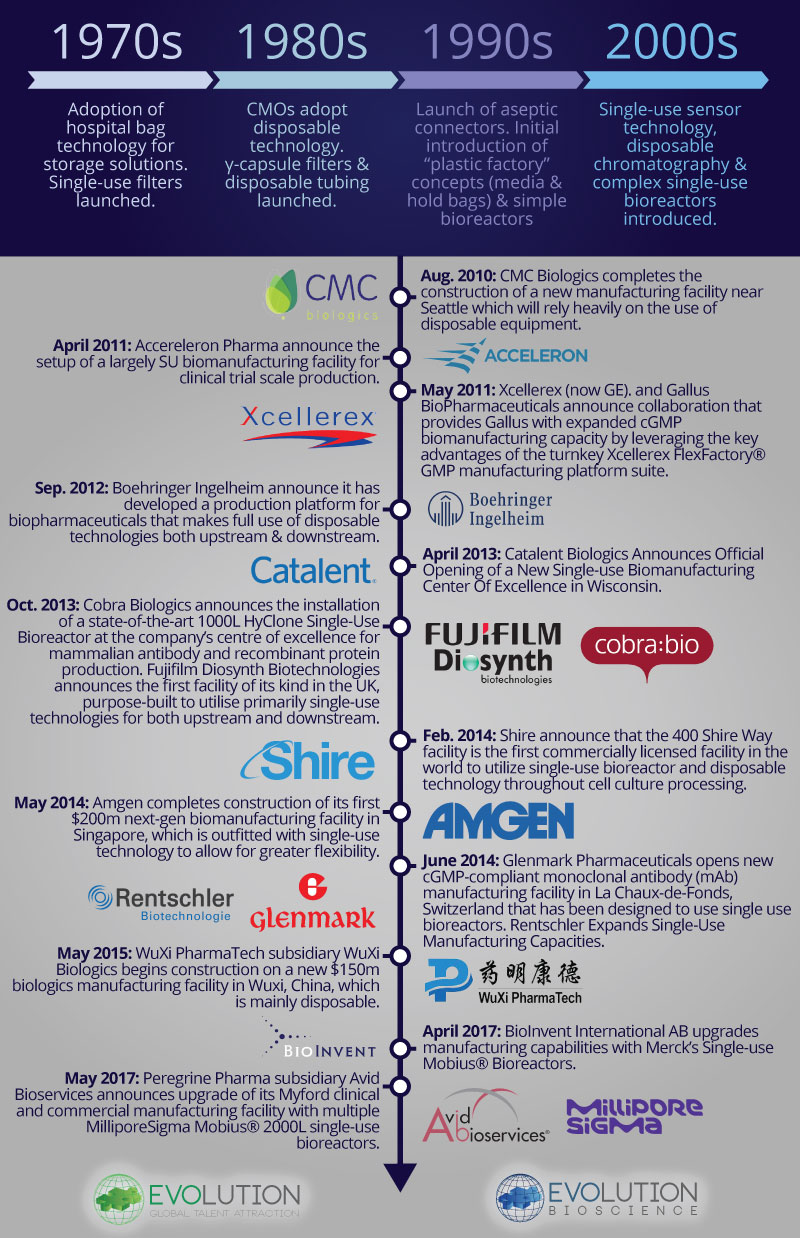As novel types of Biologics have been developed, changes in biomanufacturing approaches have been running in parallel with the intention of maximising yield and lowering production costs. Evolution Global have identified 8 key production trends that will shape the Future of BioManufacturing, the first of which is Disposable & Single Use (SU) technologies.
The Future of BioManufacturing: Disposable Single-Use Technologies
THE BENEFITS OF SINGLE-USE
SU equipment ranges from simple, single-material items such as a tubing through to complex controlled systems incorporating many components and materials, such as bioreactors. As a rule, many of the more complicated SU systems contain reusable non-product-contact elements.
The benefits of deploying SU technologies in biomanufacturing include reduced contamination risks; quicker time to market; simplicity of use; lower preliminary investment in facility; reduced operator requirement; more rapid processing speed, efficiency and flexibility. Increased competition from biosimilars and other follow-on biologics is forcing established manufacturers to find or develop and integrate new manufacturing technologies to stay competitive and conserve their market share. Single-use technologies and continuous upstream processes have proven to be cost-efficient options to increase biomass production.
HISTORICAL DEVELOPMENTS
SU has a long history in biopharmaceutical manufacturing, with developments starting in the 1970s. Critical notable developments in the wider introduction of SU technologies from include:

With the exception of some large-scale unit operations such as centrifugation, chromatography skids and UF/DF operations, all process steps can be performed in disposables up to a bag volume of around 3,000 L. This includes mixing, holding, and distribution of culture media and buffers; cell seed expansion; production fermentation; and cell removal by depth filtration, disposable chromatography columns, and UF/ DF/virus filtration. Although many SU units are already fully integrated into the biomanufacturing process through hard-piped set-ups (filters, and so on), the real progress toward completely disposable processing came with development of single-use bioreactors (SUBs). Several SUB systems are now available up to a fermentation scale of 2,000 L.
MARKET LANDSCAPE
Globally there are some 48 companies offering SU technology for bioprocessing, most of which are focused on specific aspects of upstream processing. Many have established niche positions in areas such as sensors, tubing and novel bioreactors. Major players in terms of offering multiple SU products include large, well-established life science organisations such as GE, Merck, Thermo Fisher and Sartorius Stedim, who have developed a wider range of offerings largely via strategic M&A activity.
The interactive data visualisation below highlights the companies involved in the production of SU technologies for biomanufacturing. The bubble chart is sized and coloured based on the number of SU product types each company offers, and the bubbles can be filtered by SU product type using the dropdown menu.
CHALLENGES & CONCERNS
The reasons for employing SU technologies in biomanufacturing are persuasive, however there are several challenges and concerns related to their use. Firstly, SUs can significantly increase the ongoing operating costs related to the buying and disposal of consumables. Secondly, there are concerns with leachable and extractable substances arising from product contact surfaces, which may increase the risk of contamination.
An additional challenge is the fact that there are product sourcing limitations associated with purchases of single-use equipment. In Biopharmaceutical manufacturing, it is desirable to have several vendors that offer comparable offerings/services in order to mitigate the risks of supply issues with a single vendor impacting on end product manufacture. Given that there are as yet no consistent and uniform standards of quality, installation and use, there is a risk that such challenges could impact production.
CONCLUSION
Despite these risks, biopharmaceutical manufacturers ranging from small start-up companies to large product sponsors and CMOs are increasingly implementing disposables. Ultimately it is still unclear whether there will ever be a completely 100% standalone SU-only biomanufacturing facility, or if future biomanufacturing facilities will be of a hybrid nature. Certainly, there is a strong case for 100% SU adoption in situations where the production capabilities are associated with multi-product, small-volume facilities which could also be a satellite of a larger plant location. An exception to this may be Vaccines where rapid market scale quantities have been demonstrated.
As companies strive to remain competitive in a global market, strategic implementation of single-use technologies has the potential to increase flexibility and overall output, decrease manufacturing costs, reduce facility footprint and inventory and supply chain issues faced by the pharmaceutical industry today. The proliferation, diversification and uptake of disposable technologies by biomanufacturing factories will play a vital role in enabling the manufacturing of affordable biologics as the industry adapts to the rise of biologic drug development.
Please use the buttons below to navigate through Evolution Global’s “Future of BioManufacturing” series. The next key trend examines the impact of Modular Factories.
EVOLUTION BIOSCIENCE WILL HELP YOUR BUSINESS FLOURISH



